NURS121: Bowel Cancer in Australia: Program Evaluation & Analysis
VerifiedAdded on 2023/06/12
|13
|3157
|92
Report
AI Summary
This report addresses bowel cancer as a significant public health concern in Australia, highlighting its increasing prevalence and mortality rates, particularly among indigenous Australians. It identifies modifiable risk factors such as smoking, alcohol consumption, and socioeconomic conditions that contribute to disparities in incidence and survival rates. The report evaluates the National Bowel Cancer Screening Program, discussing its aims, objectives, and key features, while also analyzing its effectiveness in reaching marginalized groups. It further examines the program's alignment with the principles of primary health care, noting limitations in cultural acceptability. The report concludes with recommendations for improving the program's impact on indigenous populations, emphasizing the need for cultural sensitivity and the involvement of general practitioners in the screening process. The annotated bibliography provides critical appraisals of relevant research articles, strengthening the analysis and recommendations presented in the report. Desklib provides students with access to similar past papers and solved assignments.
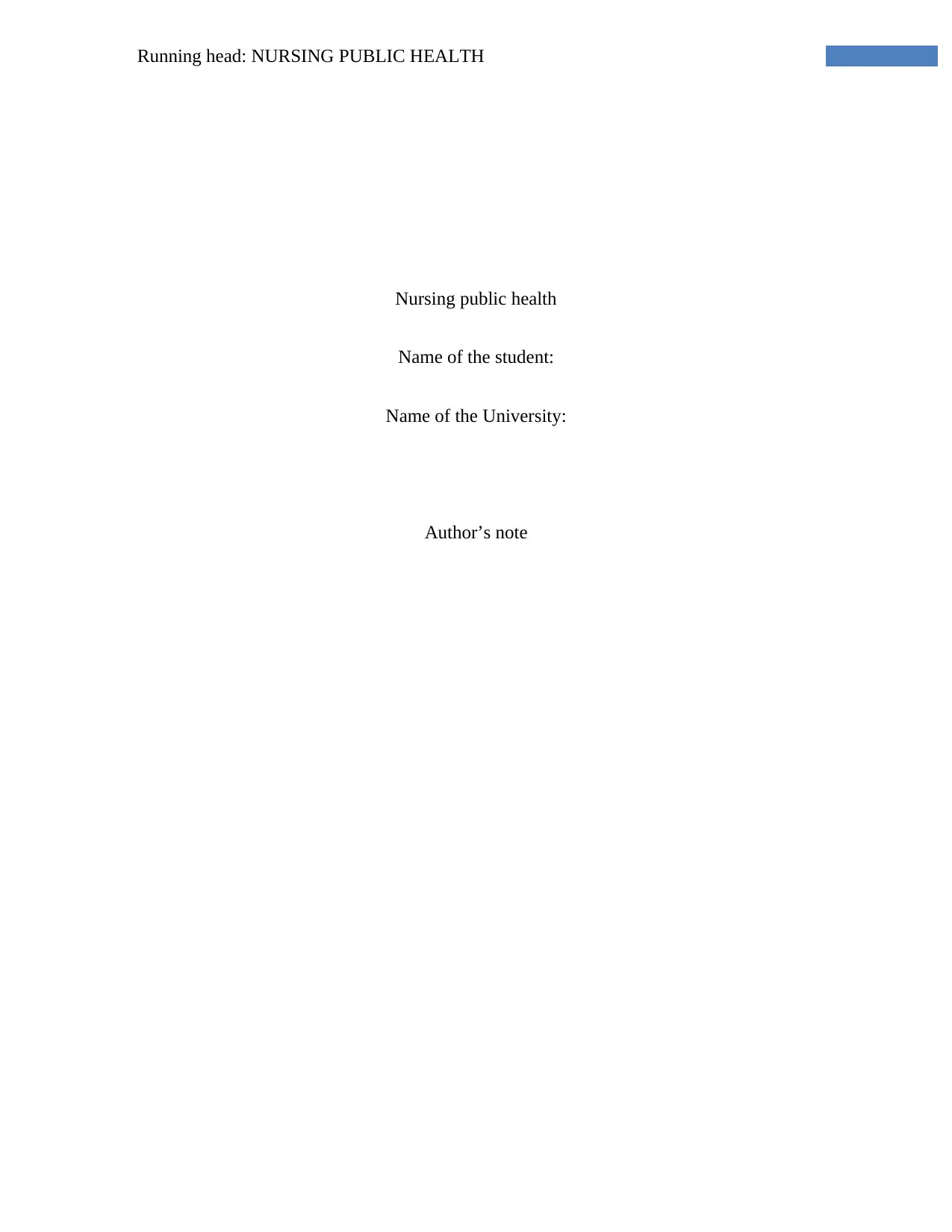
Running head: NURSING PUBLIC HEALTH
Nursing public health
Name of the student:
Name of the University:
Author’s note
Nursing public health
Name of the student:
Name of the University:
Author’s note
Paraphrase This Document
Need a fresh take? Get an instant paraphrase of this document with our AI Paraphraser
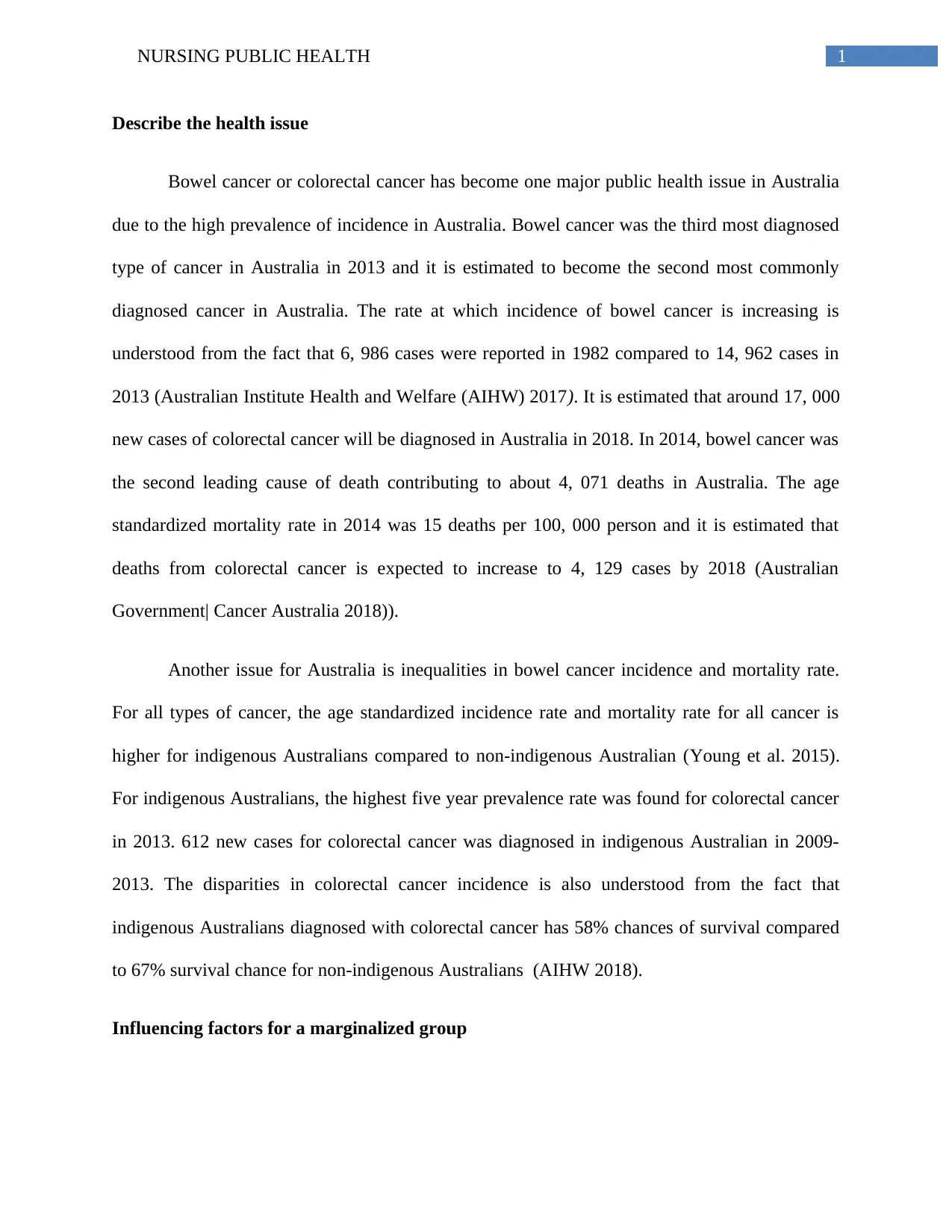
1NURSING PUBLIC HEALTH
Describe the health issue
Bowel cancer or colorectal cancer has become one major public health issue in Australia
due to the high prevalence of incidence in Australia. Bowel cancer was the third most diagnosed
type of cancer in Australia in 2013 and it is estimated to become the second most commonly
diagnosed cancer in Australia. The rate at which incidence of bowel cancer is increasing is
understood from the fact that 6, 986 cases were reported in 1982 compared to 14, 962 cases in
2013 (Australian Institute Health and Welfare (AIHW) 2017). It is estimated that around 17, 000
new cases of colorectal cancer will be diagnosed in Australia in 2018. In 2014, bowel cancer was
the second leading cause of death contributing to about 4, 071 deaths in Australia. The age
standardized mortality rate in 2014 was 15 deaths per 100, 000 person and it is estimated that
deaths from colorectal cancer is expected to increase to 4, 129 cases by 2018 (Australian
Government| Cancer Australia 2018)).
Another issue for Australia is inequalities in bowel cancer incidence and mortality rate.
For all types of cancer, the age standardized incidence rate and mortality rate for all cancer is
higher for indigenous Australians compared to non-indigenous Australian (Young et al. 2015).
For indigenous Australians, the highest five year prevalence rate was found for colorectal cancer
in 2013. 612 new cases for colorectal cancer was diagnosed in indigenous Australian in 2009-
2013. The disparities in colorectal cancer incidence is also understood from the fact that
indigenous Australians diagnosed with colorectal cancer has 58% chances of survival compared
to 67% survival chance for non-indigenous Australians (AIHW 2018).
Influencing factors for a marginalized group
Describe the health issue
Bowel cancer or colorectal cancer has become one major public health issue in Australia
due to the high prevalence of incidence in Australia. Bowel cancer was the third most diagnosed
type of cancer in Australia in 2013 and it is estimated to become the second most commonly
diagnosed cancer in Australia. The rate at which incidence of bowel cancer is increasing is
understood from the fact that 6, 986 cases were reported in 1982 compared to 14, 962 cases in
2013 (Australian Institute Health and Welfare (AIHW) 2017). It is estimated that around 17, 000
new cases of colorectal cancer will be diagnosed in Australia in 2018. In 2014, bowel cancer was
the second leading cause of death contributing to about 4, 071 deaths in Australia. The age
standardized mortality rate in 2014 was 15 deaths per 100, 000 person and it is estimated that
deaths from colorectal cancer is expected to increase to 4, 129 cases by 2018 (Australian
Government| Cancer Australia 2018)).
Another issue for Australia is inequalities in bowel cancer incidence and mortality rate.
For all types of cancer, the age standardized incidence rate and mortality rate for all cancer is
higher for indigenous Australians compared to non-indigenous Australian (Young et al. 2015).
For indigenous Australians, the highest five year prevalence rate was found for colorectal cancer
in 2013. 612 new cases for colorectal cancer was diagnosed in indigenous Australian in 2009-
2013. The disparities in colorectal cancer incidence is also understood from the fact that
indigenous Australians diagnosed with colorectal cancer has 58% chances of survival compared
to 67% survival chance for non-indigenous Australians (AIHW 2018).
Influencing factors for a marginalized group
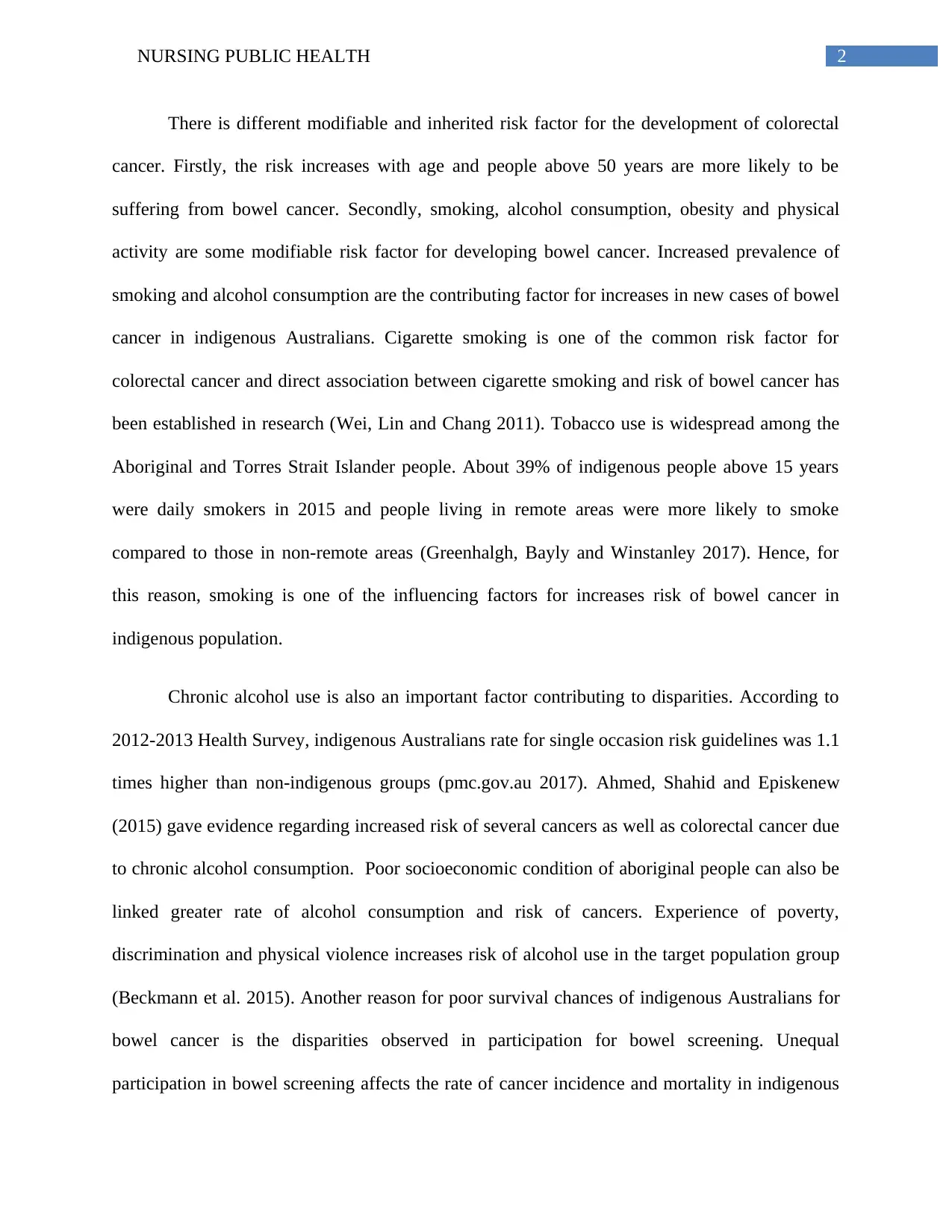
2NURSING PUBLIC HEALTH
There is different modifiable and inherited risk factor for the development of colorectal
cancer. Firstly, the risk increases with age and people above 50 years are more likely to be
suffering from bowel cancer. Secondly, smoking, alcohol consumption, obesity and physical
activity are some modifiable risk factor for developing bowel cancer. Increased prevalence of
smoking and alcohol consumption are the contributing factor for increases in new cases of bowel
cancer in indigenous Australians. Cigarette smoking is one of the common risk factor for
colorectal cancer and direct association between cigarette smoking and risk of bowel cancer has
been established in research (Wei, Lin and Chang 2011). Tobacco use is widespread among the
Aboriginal and Torres Strait Islander people. About 39% of indigenous people above 15 years
were daily smokers in 2015 and people living in remote areas were more likely to smoke
compared to those in non-remote areas (Greenhalgh, Bayly and Winstanley 2017). Hence, for
this reason, smoking is one of the influencing factors for increases risk of bowel cancer in
indigenous population.
Chronic alcohol use is also an important factor contributing to disparities. According to
2012-2013 Health Survey, indigenous Australians rate for single occasion risk guidelines was 1.1
times higher than non-indigenous groups (pmc.gov.au 2017). Ahmed, Shahid and Episkenew
(2015) gave evidence regarding increased risk of several cancers as well as colorectal cancer due
to chronic alcohol consumption. Poor socioeconomic condition of aboriginal people can also be
linked greater rate of alcohol consumption and risk of cancers. Experience of poverty,
discrimination and physical violence increases risk of alcohol use in the target population group
(Beckmann et al. 2015). Another reason for poor survival chances of indigenous Australians for
bowel cancer is the disparities observed in participation for bowel screening. Unequal
participation in bowel screening affects the rate of cancer incidence and mortality in indigenous
There is different modifiable and inherited risk factor for the development of colorectal
cancer. Firstly, the risk increases with age and people above 50 years are more likely to be
suffering from bowel cancer. Secondly, smoking, alcohol consumption, obesity and physical
activity are some modifiable risk factor for developing bowel cancer. Increased prevalence of
smoking and alcohol consumption are the contributing factor for increases in new cases of bowel
cancer in indigenous Australians. Cigarette smoking is one of the common risk factor for
colorectal cancer and direct association between cigarette smoking and risk of bowel cancer has
been established in research (Wei, Lin and Chang 2011). Tobacco use is widespread among the
Aboriginal and Torres Strait Islander people. About 39% of indigenous people above 15 years
were daily smokers in 2015 and people living in remote areas were more likely to smoke
compared to those in non-remote areas (Greenhalgh, Bayly and Winstanley 2017). Hence, for
this reason, smoking is one of the influencing factors for increases risk of bowel cancer in
indigenous population.
Chronic alcohol use is also an important factor contributing to disparities. According to
2012-2013 Health Survey, indigenous Australians rate for single occasion risk guidelines was 1.1
times higher than non-indigenous groups (pmc.gov.au 2017). Ahmed, Shahid and Episkenew
(2015) gave evidence regarding increased risk of several cancers as well as colorectal cancer due
to chronic alcohol consumption. Poor socioeconomic condition of aboriginal people can also be
linked greater rate of alcohol consumption and risk of cancers. Experience of poverty,
discrimination and physical violence increases risk of alcohol use in the target population group
(Beckmann et al. 2015). Another reason for poor survival chances of indigenous Australians for
bowel cancer is the disparities observed in participation for bowel screening. Unequal
participation in bowel screening affects the rate of cancer incidence and mortality in indigenous
⊘ This is a preview!⊘
Do you want full access?
Subscribe today to unlock all pages.

Trusted by 1+ million students worldwide
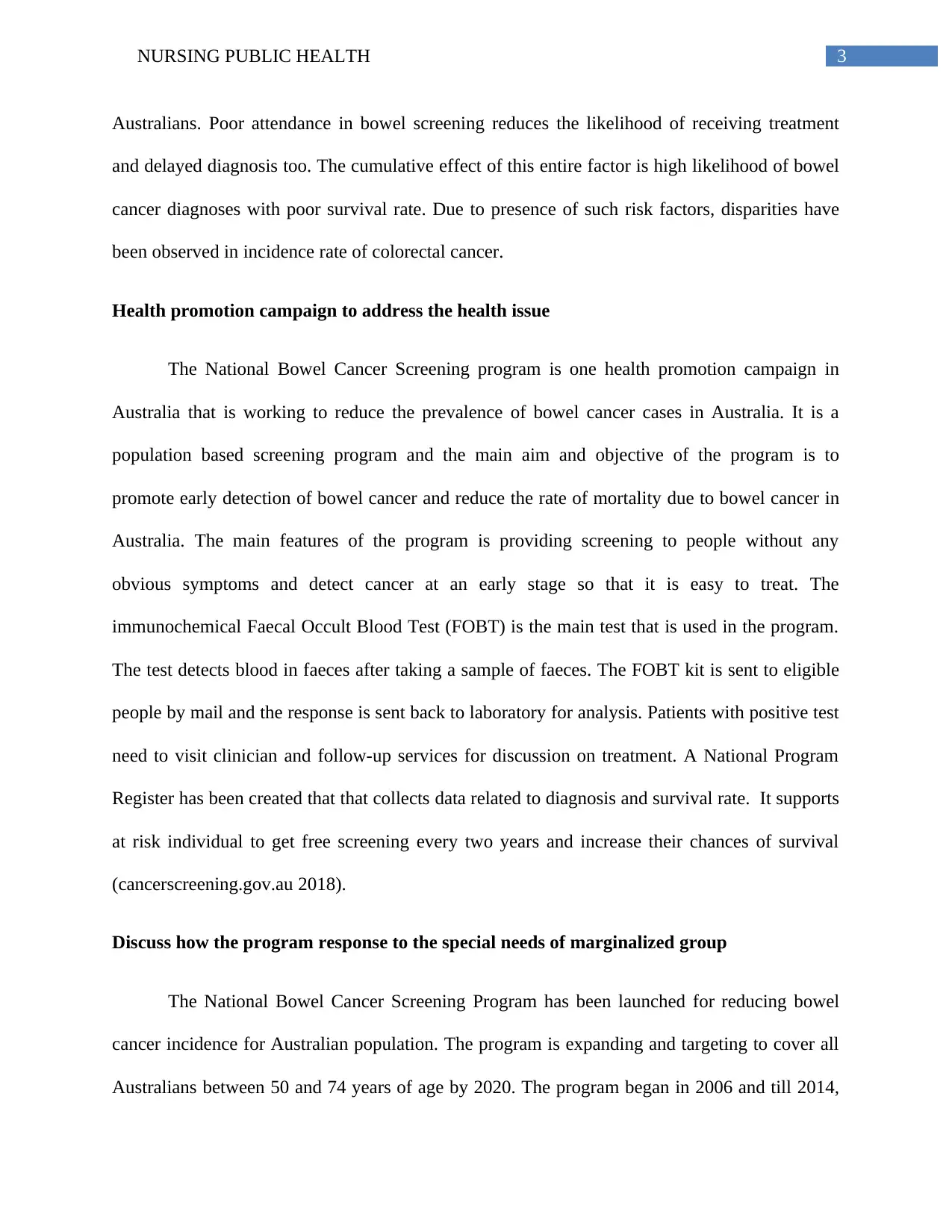
3NURSING PUBLIC HEALTH
Australians. Poor attendance in bowel screening reduces the likelihood of receiving treatment
and delayed diagnosis too. The cumulative effect of this entire factor is high likelihood of bowel
cancer diagnoses with poor survival rate. Due to presence of such risk factors, disparities have
been observed in incidence rate of colorectal cancer.
Health promotion campaign to address the health issue
The National Bowel Cancer Screening program is one health promotion campaign in
Australia that is working to reduce the prevalence of bowel cancer cases in Australia. It is a
population based screening program and the main aim and objective of the program is to
promote early detection of bowel cancer and reduce the rate of mortality due to bowel cancer in
Australia. The main features of the program is providing screening to people without any
obvious symptoms and detect cancer at an early stage so that it is easy to treat. The
immunochemical Faecal Occult Blood Test (FOBT) is the main test that is used in the program.
The test detects blood in faeces after taking a sample of faeces. The FOBT kit is sent to eligible
people by mail and the response is sent back to laboratory for analysis. Patients with positive test
need to visit clinician and follow-up services for discussion on treatment. A National Program
Register has been created that that collects data related to diagnosis and survival rate. It supports
at risk individual to get free screening every two years and increase their chances of survival
(cancerscreening.gov.au 2018).
Discuss how the program response to the special needs of marginalized group
The National Bowel Cancer Screening Program has been launched for reducing bowel
cancer incidence for Australian population. The program is expanding and targeting to cover all
Australians between 50 and 74 years of age by 2020. The program began in 2006 and till 2014,
Australians. Poor attendance in bowel screening reduces the likelihood of receiving treatment
and delayed diagnosis too. The cumulative effect of this entire factor is high likelihood of bowel
cancer diagnoses with poor survival rate. Due to presence of such risk factors, disparities have
been observed in incidence rate of colorectal cancer.
Health promotion campaign to address the health issue
The National Bowel Cancer Screening program is one health promotion campaign in
Australia that is working to reduce the prevalence of bowel cancer cases in Australia. It is a
population based screening program and the main aim and objective of the program is to
promote early detection of bowel cancer and reduce the rate of mortality due to bowel cancer in
Australia. The main features of the program is providing screening to people without any
obvious symptoms and detect cancer at an early stage so that it is easy to treat. The
immunochemical Faecal Occult Blood Test (FOBT) is the main test that is used in the program.
The test detects blood in faeces after taking a sample of faeces. The FOBT kit is sent to eligible
people by mail and the response is sent back to laboratory for analysis. Patients with positive test
need to visit clinician and follow-up services for discussion on treatment. A National Program
Register has been created that that collects data related to diagnosis and survival rate. It supports
at risk individual to get free screening every two years and increase their chances of survival
(cancerscreening.gov.au 2018).
Discuss how the program response to the special needs of marginalized group
The National Bowel Cancer Screening Program has been launched for reducing bowel
cancer incidence for Australian population. The program is expanding and targeting to cover all
Australians between 50 and 74 years of age by 2020. The program began in 2006 and till 2014,
Paraphrase This Document
Need a fresh take? Get an instant paraphrase of this document with our AI Paraphraser
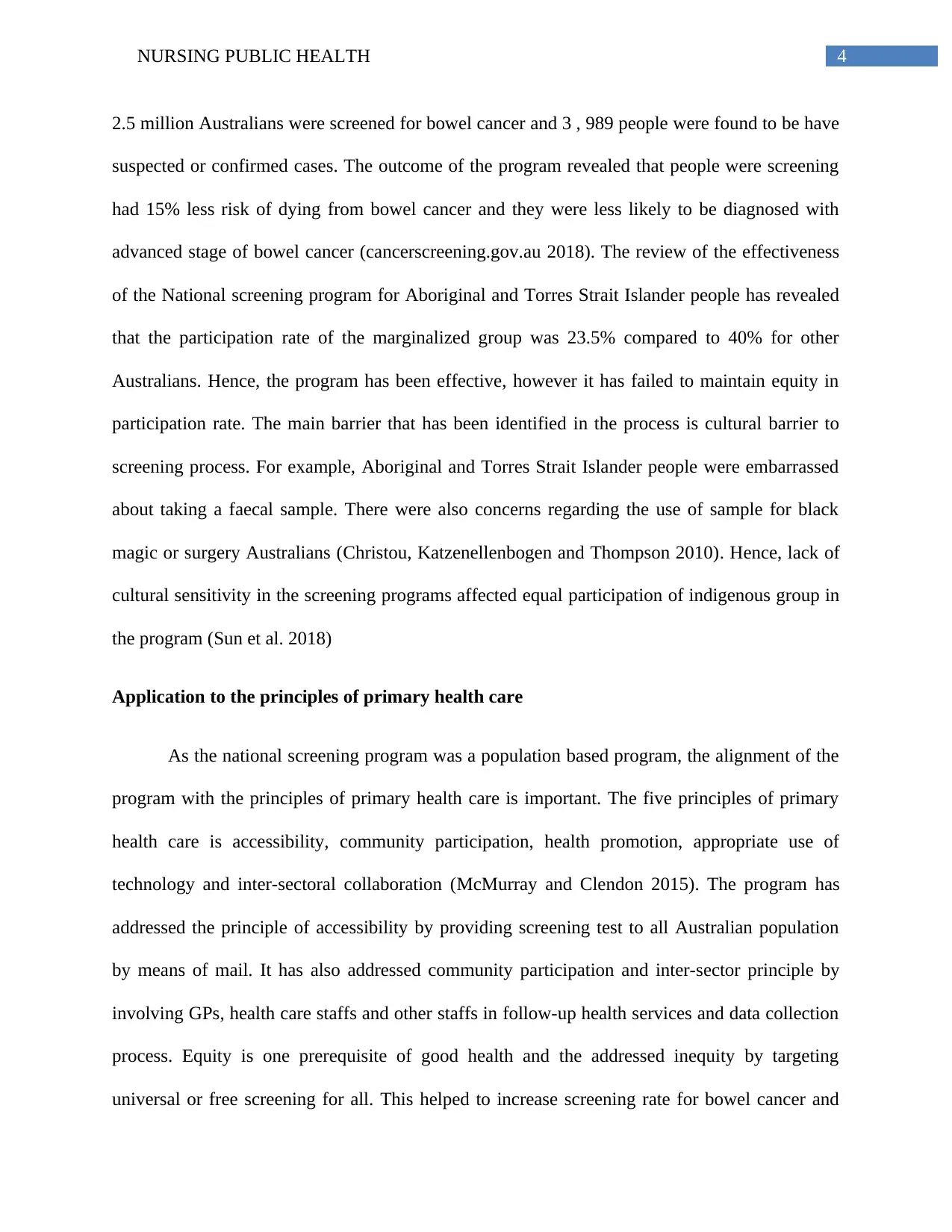
4NURSING PUBLIC HEALTH
2.5 million Australians were screened for bowel cancer and 3 , 989 people were found to be have
suspected or confirmed cases. The outcome of the program revealed that people were screening
had 15% less risk of dying from bowel cancer and they were less likely to be diagnosed with
advanced stage of bowel cancer (cancerscreening.gov.au 2018). The review of the effectiveness
of the National screening program for Aboriginal and Torres Strait Islander people has revealed
that the participation rate of the marginalized group was 23.5% compared to 40% for other
Australians. Hence, the program has been effective, however it has failed to maintain equity in
participation rate. The main barrier that has been identified in the process is cultural barrier to
screening process. For example, Aboriginal and Torres Strait Islander people were embarrassed
about taking a faecal sample. There were also concerns regarding the use of sample for black
magic or surgery Australians (Christou, Katzenellenbogen and Thompson 2010). Hence, lack of
cultural sensitivity in the screening programs affected equal participation of indigenous group in
the program (Sun et al. 2018)
Application to the principles of primary health care
As the national screening program was a population based program, the alignment of the
program with the principles of primary health care is important. The five principles of primary
health care is accessibility, community participation, health promotion, appropriate use of
technology and inter-sectoral collaboration (McMurray and Clendon 2015). The program has
addressed the principle of accessibility by providing screening test to all Australian population
by means of mail. It has also addressed community participation and inter-sector principle by
involving GPs, health care staffs and other staffs in follow-up health services and data collection
process. Equity is one prerequisite of good health and the addressed inequity by targeting
universal or free screening for all. This helped to increase screening rate for bowel cancer and
2.5 million Australians were screened for bowel cancer and 3 , 989 people were found to be have
suspected or confirmed cases. The outcome of the program revealed that people were screening
had 15% less risk of dying from bowel cancer and they were less likely to be diagnosed with
advanced stage of bowel cancer (cancerscreening.gov.au 2018). The review of the effectiveness
of the National screening program for Aboriginal and Torres Strait Islander people has revealed
that the participation rate of the marginalized group was 23.5% compared to 40% for other
Australians. Hence, the program has been effective, however it has failed to maintain equity in
participation rate. The main barrier that has been identified in the process is cultural barrier to
screening process. For example, Aboriginal and Torres Strait Islander people were embarrassed
about taking a faecal sample. There were also concerns regarding the use of sample for black
magic or surgery Australians (Christou, Katzenellenbogen and Thompson 2010). Hence, lack of
cultural sensitivity in the screening programs affected equal participation of indigenous group in
the program (Sun et al. 2018)
Application to the principles of primary health care
As the national screening program was a population based program, the alignment of the
program with the principles of primary health care is important. The five principles of primary
health care is accessibility, community participation, health promotion, appropriate use of
technology and inter-sectoral collaboration (McMurray and Clendon 2015). The program has
addressed the principle of accessibility by providing screening test to all Australian population
by means of mail. It has also addressed community participation and inter-sector principle by
involving GPs, health care staffs and other staffs in follow-up health services and data collection
process. Equity is one prerequisite of good health and the addressed inequity by targeting
universal or free screening for all. This helped to increase screening rate for bowel cancer and
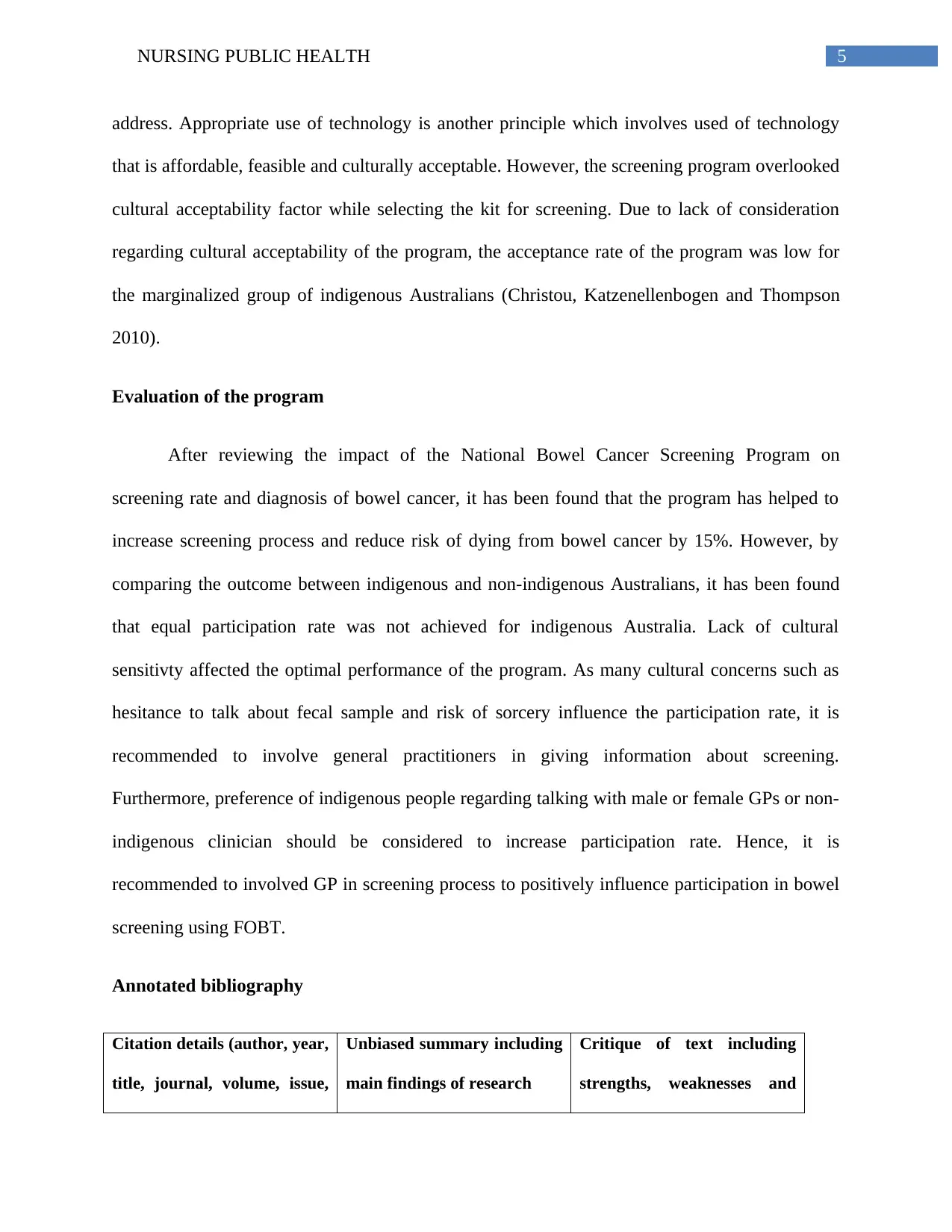
5NURSING PUBLIC HEALTH
address. Appropriate use of technology is another principle which involves used of technology
that is affordable, feasible and culturally acceptable. However, the screening program overlooked
cultural acceptability factor while selecting the kit for screening. Due to lack of consideration
regarding cultural acceptability of the program, the acceptance rate of the program was low for
the marginalized group of indigenous Australians (Christou, Katzenellenbogen and Thompson
2010).
Evaluation of the program
After reviewing the impact of the National Bowel Cancer Screening Program on
screening rate and diagnosis of bowel cancer, it has been found that the program has helped to
increase screening process and reduce risk of dying from bowel cancer by 15%. However, by
comparing the outcome between indigenous and non-indigenous Australians, it has been found
that equal participation rate was not achieved for indigenous Australia. Lack of cultural
sensitivty affected the optimal performance of the program. As many cultural concerns such as
hesitance to talk about fecal sample and risk of sorcery influence the participation rate, it is
recommended to involve general practitioners in giving information about screening.
Furthermore, preference of indigenous people regarding talking with male or female GPs or non-
indigenous clinician should be considered to increase participation rate. Hence, it is
recommended to involved GP in screening process to positively influence participation in bowel
screening using FOBT.
Annotated bibliography
Citation details (author, year,
title, journal, volume, issue,
Unbiased summary including
main findings of research
Critique of text including
strengths, weaknesses and
address. Appropriate use of technology is another principle which involves used of technology
that is affordable, feasible and culturally acceptable. However, the screening program overlooked
cultural acceptability factor while selecting the kit for screening. Due to lack of consideration
regarding cultural acceptability of the program, the acceptance rate of the program was low for
the marginalized group of indigenous Australians (Christou, Katzenellenbogen and Thompson
2010).
Evaluation of the program
After reviewing the impact of the National Bowel Cancer Screening Program on
screening rate and diagnosis of bowel cancer, it has been found that the program has helped to
increase screening process and reduce risk of dying from bowel cancer by 15%. However, by
comparing the outcome between indigenous and non-indigenous Australians, it has been found
that equal participation rate was not achieved for indigenous Australia. Lack of cultural
sensitivty affected the optimal performance of the program. As many cultural concerns such as
hesitance to talk about fecal sample and risk of sorcery influence the participation rate, it is
recommended to involve general practitioners in giving information about screening.
Furthermore, preference of indigenous people regarding talking with male or female GPs or non-
indigenous clinician should be considered to increase participation rate. Hence, it is
recommended to involved GP in screening process to positively influence participation in bowel
screening using FOBT.
Annotated bibliography
Citation details (author, year,
title, journal, volume, issue,
Unbiased summary including
main findings of research
Critique of text including
strengths, weaknesses and
⊘ This is a preview!⊘
Do you want full access?
Subscribe today to unlock all pages.

Trusted by 1+ million students worldwide
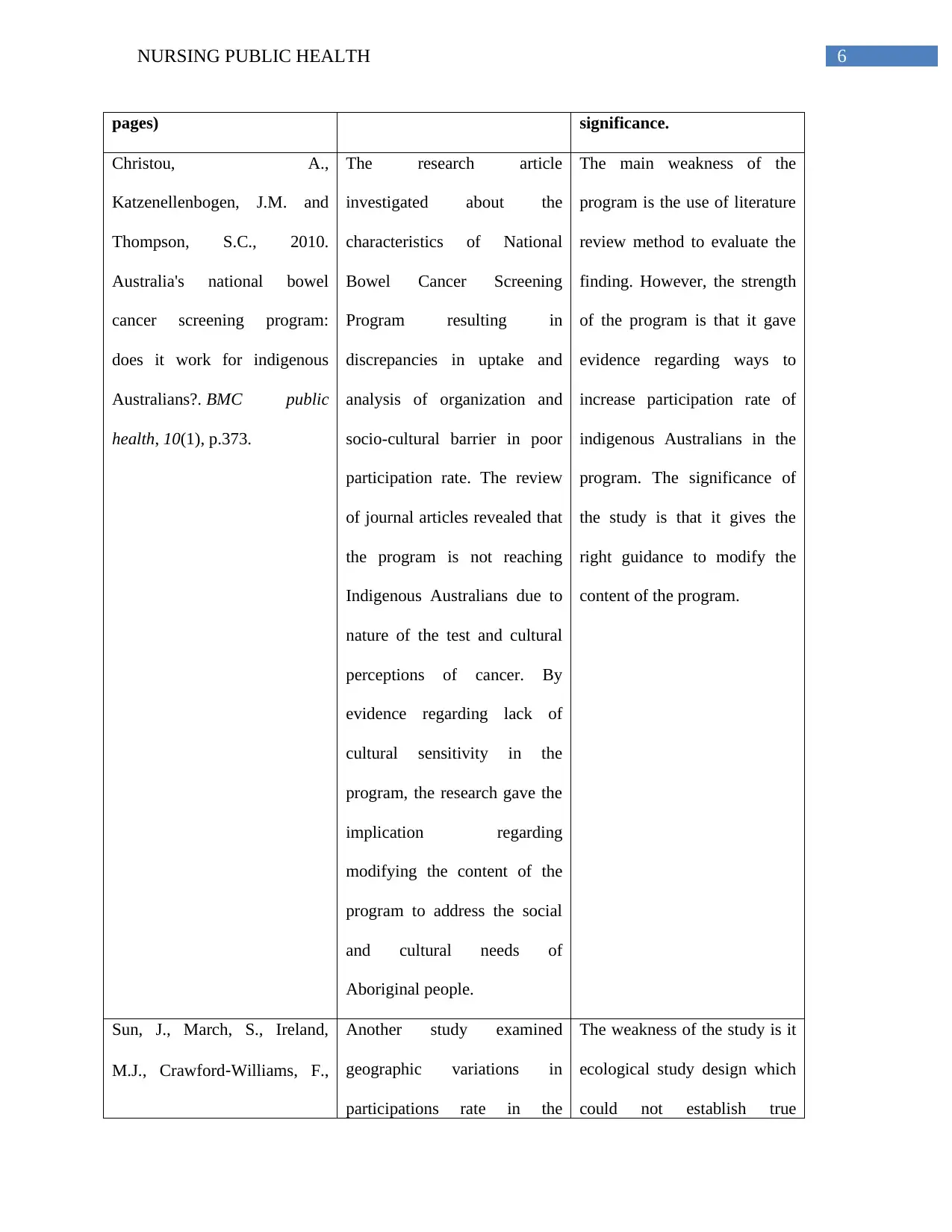
6NURSING PUBLIC HEALTH
pages) significance.
Christou, A.,
Katzenellenbogen, J.M. and
Thompson, S.C., 2010.
Australia's national bowel
cancer screening program:
does it work for indigenous
Australians?. BMC public
health, 10(1), p.373.
The research article
investigated about the
characteristics of National
Bowel Cancer Screening
Program resulting in
discrepancies in uptake and
analysis of organization and
socio-cultural barrier in poor
participation rate. The review
of journal articles revealed that
the program is not reaching
Indigenous Australians due to
nature of the test and cultural
perceptions of cancer. By
evidence regarding lack of
cultural sensitivity in the
program, the research gave the
implication regarding
modifying the content of the
program to address the social
and cultural needs of
Aboriginal people.
The main weakness of the
program is the use of literature
review method to evaluate the
finding. However, the strength
of the program is that it gave
evidence regarding ways to
increase participation rate of
indigenous Australians in the
program. The significance of
the study is that it gives the
right guidance to modify the
content of the program.
Sun, J., March, S., Ireland,
M.J., Crawford‐Williams, F.,
Another study examined
geographic variations in
participations rate in the
The weakness of the study is it
ecological study design which
could not establish true
pages) significance.
Christou, A.,
Katzenellenbogen, J.M. and
Thompson, S.C., 2010.
Australia's national bowel
cancer screening program:
does it work for indigenous
Australians?. BMC public
health, 10(1), p.373.
The research article
investigated about the
characteristics of National
Bowel Cancer Screening
Program resulting in
discrepancies in uptake and
analysis of organization and
socio-cultural barrier in poor
participation rate. The review
of journal articles revealed that
the program is not reaching
Indigenous Australians due to
nature of the test and cultural
perceptions of cancer. By
evidence regarding lack of
cultural sensitivity in the
program, the research gave the
implication regarding
modifying the content of the
program to address the social
and cultural needs of
Aboriginal people.
The main weakness of the
program is the use of literature
review method to evaluate the
finding. However, the strength
of the program is that it gave
evidence regarding ways to
increase participation rate of
indigenous Australians in the
program. The significance of
the study is that it gives the
right guidance to modify the
content of the program.
Sun, J., March, S., Ireland,
M.J., Crawford‐Williams, F.,
Another study examined
geographic variations in
participations rate in the
The weakness of the study is it
ecological study design which
could not establish true
Paraphrase This Document
Need a fresh take? Get an instant paraphrase of this document with our AI Paraphraser
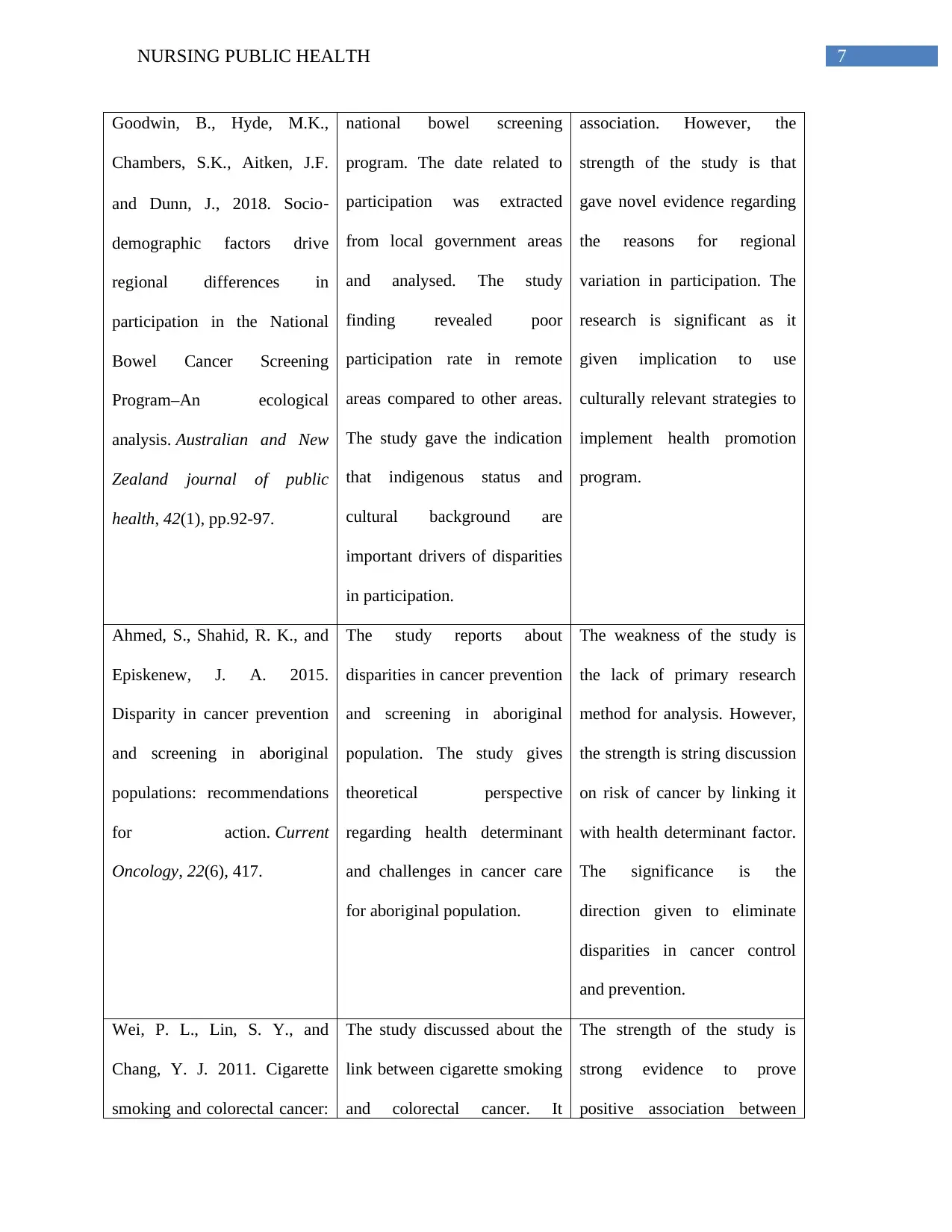
7NURSING PUBLIC HEALTH
Goodwin, B., Hyde, M.K.,
Chambers, S.K., Aitken, J.F.
and Dunn, J., 2018. Socio‐
demographic factors drive
regional differences in
participation in the National
Bowel Cancer Screening
Program–An ecological
analysis. Australian and New
Zealand journal of public
health, 42(1), pp.92-97.
national bowel screening
program. The date related to
participation was extracted
from local government areas
and analysed. The study
finding revealed poor
participation rate in remote
areas compared to other areas.
The study gave the indication
that indigenous status and
cultural background are
important drivers of disparities
in participation.
association. However, the
strength of the study is that
gave novel evidence regarding
the reasons for regional
variation in participation. The
research is significant as it
given implication to use
culturally relevant strategies to
implement health promotion
program.
Ahmed, S., Shahid, R. K., and
Episkenew, J. A. 2015.
Disparity in cancer prevention
and screening in aboriginal
populations: recommendations
for action. Current
Oncology, 22(6), 417.
The study reports about
disparities in cancer prevention
and screening in aboriginal
population. The study gives
theoretical perspective
regarding health determinant
and challenges in cancer care
for aboriginal population.
The weakness of the study is
the lack of primary research
method for analysis. However,
the strength is string discussion
on risk of cancer by linking it
with health determinant factor.
The significance is the
direction given to eliminate
disparities in cancer control
and prevention.
Wei, P. L., Lin, S. Y., and
Chang, Y. J. 2011. Cigarette
smoking and colorectal cancer:
The study discussed about the
link between cigarette smoking
and colorectal cancer. It
The strength of the study is
strong evidence to prove
positive association between
Goodwin, B., Hyde, M.K.,
Chambers, S.K., Aitken, J.F.
and Dunn, J., 2018. Socio‐
demographic factors drive
regional differences in
participation in the National
Bowel Cancer Screening
Program–An ecological
analysis. Australian and New
Zealand journal of public
health, 42(1), pp.92-97.
national bowel screening
program. The date related to
participation was extracted
from local government areas
and analysed. The study
finding revealed poor
participation rate in remote
areas compared to other areas.
The study gave the indication
that indigenous status and
cultural background are
important drivers of disparities
in participation.
association. However, the
strength of the study is that
gave novel evidence regarding
the reasons for regional
variation in participation. The
research is significant as it
given implication to use
culturally relevant strategies to
implement health promotion
program.
Ahmed, S., Shahid, R. K., and
Episkenew, J. A. 2015.
Disparity in cancer prevention
and screening in aboriginal
populations: recommendations
for action. Current
Oncology, 22(6), 417.
The study reports about
disparities in cancer prevention
and screening in aboriginal
population. The study gives
theoretical perspective
regarding health determinant
and challenges in cancer care
for aboriginal population.
The weakness of the study is
the lack of primary research
method for analysis. However,
the strength is string discussion
on risk of cancer by linking it
with health determinant factor.
The significance is the
direction given to eliminate
disparities in cancer control
and prevention.
Wei, P. L., Lin, S. Y., and
Chang, Y. J. 2011. Cigarette
smoking and colorectal cancer:
The study discussed about the
link between cigarette smoking
and colorectal cancer. It
The strength of the study is
strong evidence to prove
positive association between
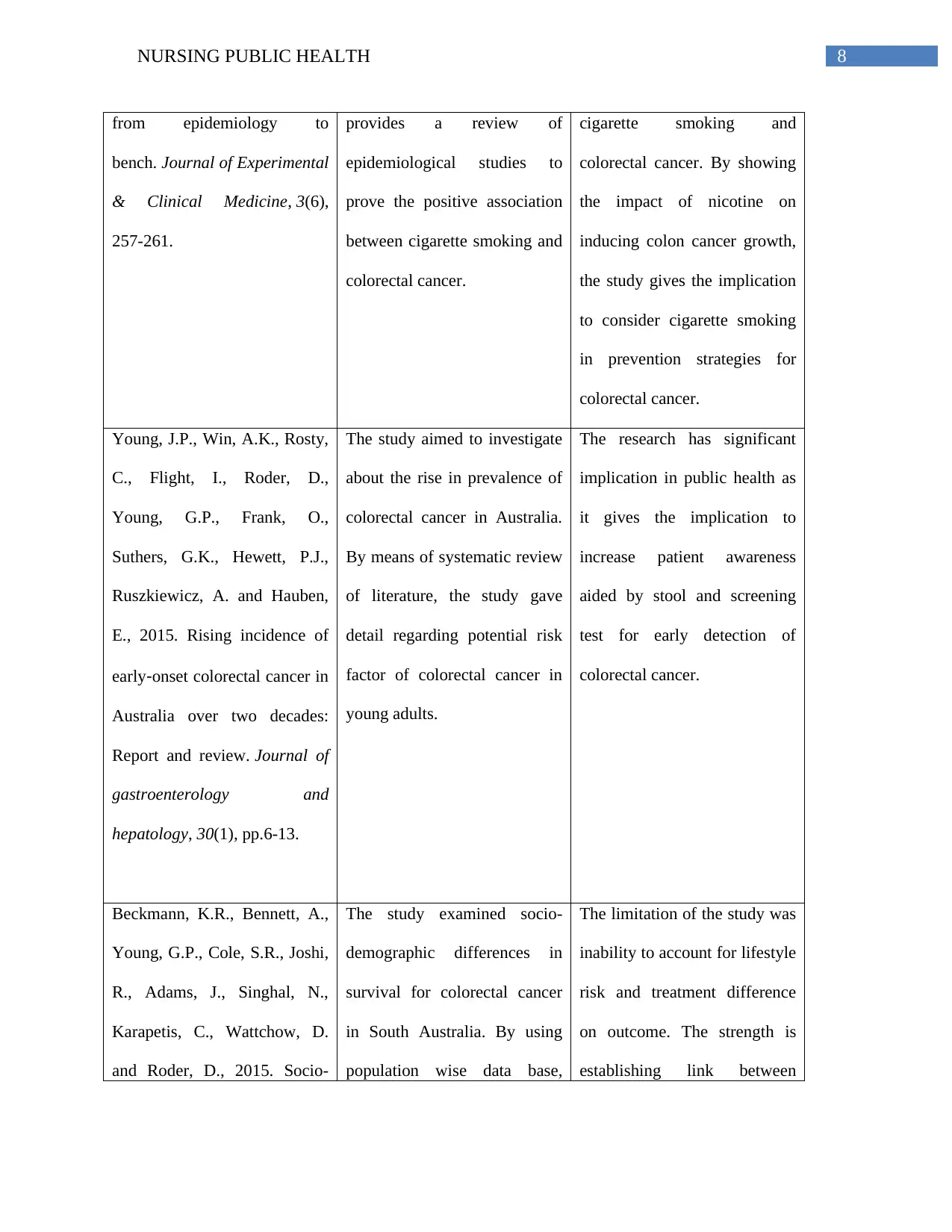
8NURSING PUBLIC HEALTH
from epidemiology to
bench. Journal of Experimental
& Clinical Medicine, 3(6),
257-261.
provides a review of
epidemiological studies to
prove the positive association
between cigarette smoking and
colorectal cancer.
cigarette smoking and
colorectal cancer. By showing
the impact of nicotine on
inducing colon cancer growth,
the study gives the implication
to consider cigarette smoking
in prevention strategies for
colorectal cancer.
Young, J.P., Win, A.K., Rosty,
C., Flight, I., Roder, D.,
Young, G.P., Frank, O.,
Suthers, G.K., Hewett, P.J.,
Ruszkiewicz, A. and Hauben,
E., 2015. Rising incidence of
early‐onset colorectal cancer in
Australia over two decades:
Report and review. Journal of
gastroenterology and
hepatology, 30(1), pp.6-13.
The study aimed to investigate
about the rise in prevalence of
colorectal cancer in Australia.
By means of systematic review
of literature, the study gave
detail regarding potential risk
factor of colorectal cancer in
young adults.
The research has significant
implication in public health as
it gives the implication to
increase patient awareness
aided by stool and screening
test for early detection of
colorectal cancer.
Beckmann, K.R., Bennett, A.,
Young, G.P., Cole, S.R., Joshi,
R., Adams, J., Singhal, N.,
Karapetis, C., Wattchow, D.
and Roder, D., 2015. Socio-
The study examined socio-
demographic differences in
survival for colorectal cancer
in South Australia. By using
population wise data base,
The limitation of the study was
inability to account for lifestyle
risk and treatment difference
on outcome. The strength is
establishing link between
from epidemiology to
bench. Journal of Experimental
& Clinical Medicine, 3(6),
257-261.
provides a review of
epidemiological studies to
prove the positive association
between cigarette smoking and
colorectal cancer.
cigarette smoking and
colorectal cancer. By showing
the impact of nicotine on
inducing colon cancer growth,
the study gives the implication
to consider cigarette smoking
in prevention strategies for
colorectal cancer.
Young, J.P., Win, A.K., Rosty,
C., Flight, I., Roder, D.,
Young, G.P., Frank, O.,
Suthers, G.K., Hewett, P.J.,
Ruszkiewicz, A. and Hauben,
E., 2015. Rising incidence of
early‐onset colorectal cancer in
Australia over two decades:
Report and review. Journal of
gastroenterology and
hepatology, 30(1), pp.6-13.
The study aimed to investigate
about the rise in prevalence of
colorectal cancer in Australia.
By means of systematic review
of literature, the study gave
detail regarding potential risk
factor of colorectal cancer in
young adults.
The research has significant
implication in public health as
it gives the implication to
increase patient awareness
aided by stool and screening
test for early detection of
colorectal cancer.
Beckmann, K.R., Bennett, A.,
Young, G.P., Cole, S.R., Joshi,
R., Adams, J., Singhal, N.,
Karapetis, C., Wattchow, D.
and Roder, D., 2015. Socio-
The study examined socio-
demographic differences in
survival for colorectal cancer
in South Australia. By using
population wise data base,
The limitation of the study was
inability to account for lifestyle
risk and treatment difference
on outcome. The strength is
establishing link between
⊘ This is a preview!⊘
Do you want full access?
Subscribe today to unlock all pages.

Trusted by 1+ million students worldwide
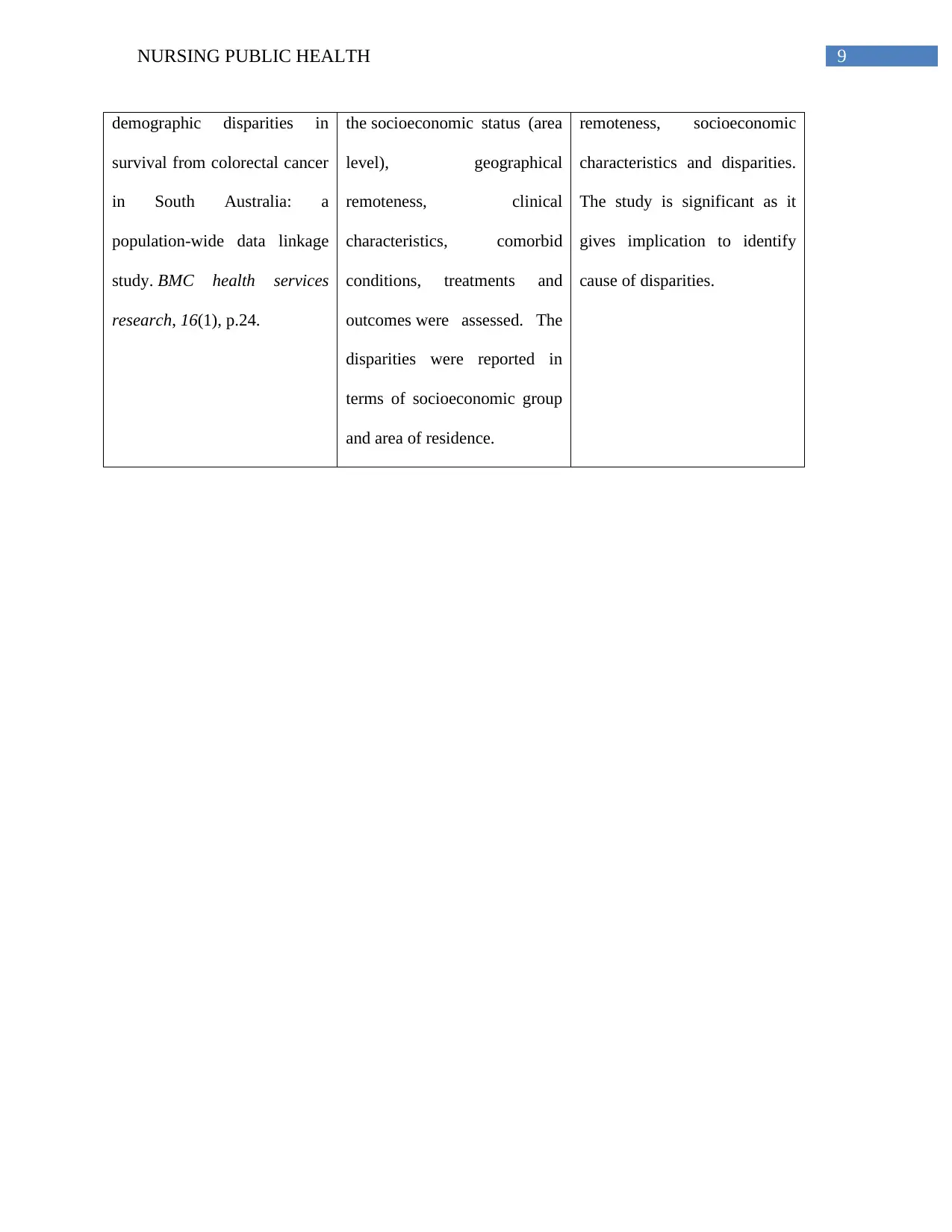
9NURSING PUBLIC HEALTH
demographic disparities in
survival from colorectal cancer
in South Australia: a
population-wide data linkage
study. BMC health services
research, 16(1), p.24.
the socioeconomic status (area
level), geographical
remoteness, clinical
characteristics, comorbid
conditions, treatments and
outcomes were assessed. The
disparities were reported in
terms of socioeconomic group
and area of residence.
remoteness, socioeconomic
characteristics and disparities.
The study is significant as it
gives implication to identify
cause of disparities.
demographic disparities in
survival from colorectal cancer
in South Australia: a
population-wide data linkage
study. BMC health services
research, 16(1), p.24.
the socioeconomic status (area
level), geographical
remoteness, clinical
characteristics, comorbid
conditions, treatments and
outcomes were assessed. The
disparities were reported in
terms of socioeconomic group
and area of residence.
remoteness, socioeconomic
characteristics and disparities.
The study is significant as it
gives implication to identify
cause of disparities.
Paraphrase This Document
Need a fresh take? Get an instant paraphrase of this document with our AI Paraphraser
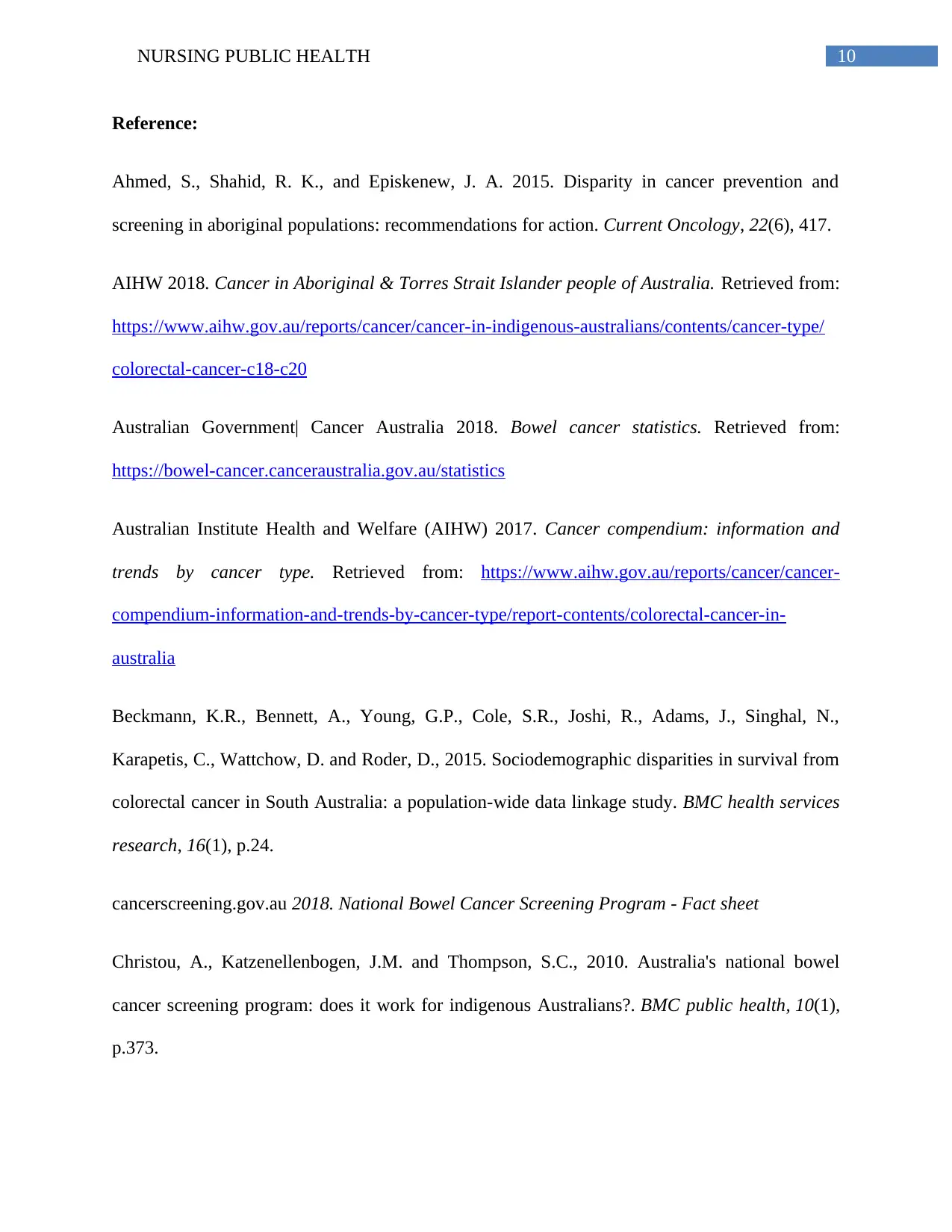
10NURSING PUBLIC HEALTH
Reference:
Ahmed, S., Shahid, R. K., and Episkenew, J. A. 2015. Disparity in cancer prevention and
screening in aboriginal populations: recommendations for action. Current Oncology, 22(6), 417.
AIHW 2018. Cancer in Aboriginal & Torres Strait Islander people of Australia. Retrieved from:
https://www.aihw.gov.au/reports/cancer/cancer-in-indigenous-australians/contents/cancer-type/
colorectal-cancer-c18-c20
Australian Government| Cancer Australia 2018. Bowel cancer statistics. Retrieved from:
https://bowel-cancer.canceraustralia.gov.au/statistics
Australian Institute Health and Welfare (AIHW) 2017. Cancer compendium: information and
trends by cancer type. Retrieved from: https://www.aihw.gov.au/reports/cancer/cancer-
compendium-information-and-trends-by-cancer-type/report-contents/colorectal-cancer-in-
australia
Beckmann, K.R., Bennett, A., Young, G.P., Cole, S.R., Joshi, R., Adams, J., Singhal, N.,
Karapetis, C., Wattchow, D. and Roder, D., 2015. Sociodemographic disparities in survival from
colorectal cancer in South Australia: a population-wide data linkage study. BMC health services
research, 16(1), p.24.
cancerscreening.gov.au 2018. National Bowel Cancer Screening Program - Fact sheet
Christou, A., Katzenellenbogen, J.M. and Thompson, S.C., 2010. Australia's national bowel
cancer screening program: does it work for indigenous Australians?. BMC public health, 10(1),
p.373.
Reference:
Ahmed, S., Shahid, R. K., and Episkenew, J. A. 2015. Disparity in cancer prevention and
screening in aboriginal populations: recommendations for action. Current Oncology, 22(6), 417.
AIHW 2018. Cancer in Aboriginal & Torres Strait Islander people of Australia. Retrieved from:
https://www.aihw.gov.au/reports/cancer/cancer-in-indigenous-australians/contents/cancer-type/
colorectal-cancer-c18-c20
Australian Government| Cancer Australia 2018. Bowel cancer statistics. Retrieved from:
https://bowel-cancer.canceraustralia.gov.au/statistics
Australian Institute Health and Welfare (AIHW) 2017. Cancer compendium: information and
trends by cancer type. Retrieved from: https://www.aihw.gov.au/reports/cancer/cancer-
compendium-information-and-trends-by-cancer-type/report-contents/colorectal-cancer-in-
australia
Beckmann, K.R., Bennett, A., Young, G.P., Cole, S.R., Joshi, R., Adams, J., Singhal, N.,
Karapetis, C., Wattchow, D. and Roder, D., 2015. Sociodemographic disparities in survival from
colorectal cancer in South Australia: a population-wide data linkage study. BMC health services
research, 16(1), p.24.
cancerscreening.gov.au 2018. National Bowel Cancer Screening Program - Fact sheet
Christou, A., Katzenellenbogen, J.M. and Thompson, S.C., 2010. Australia's national bowel
cancer screening program: does it work for indigenous Australians?. BMC public health, 10(1),
p.373.
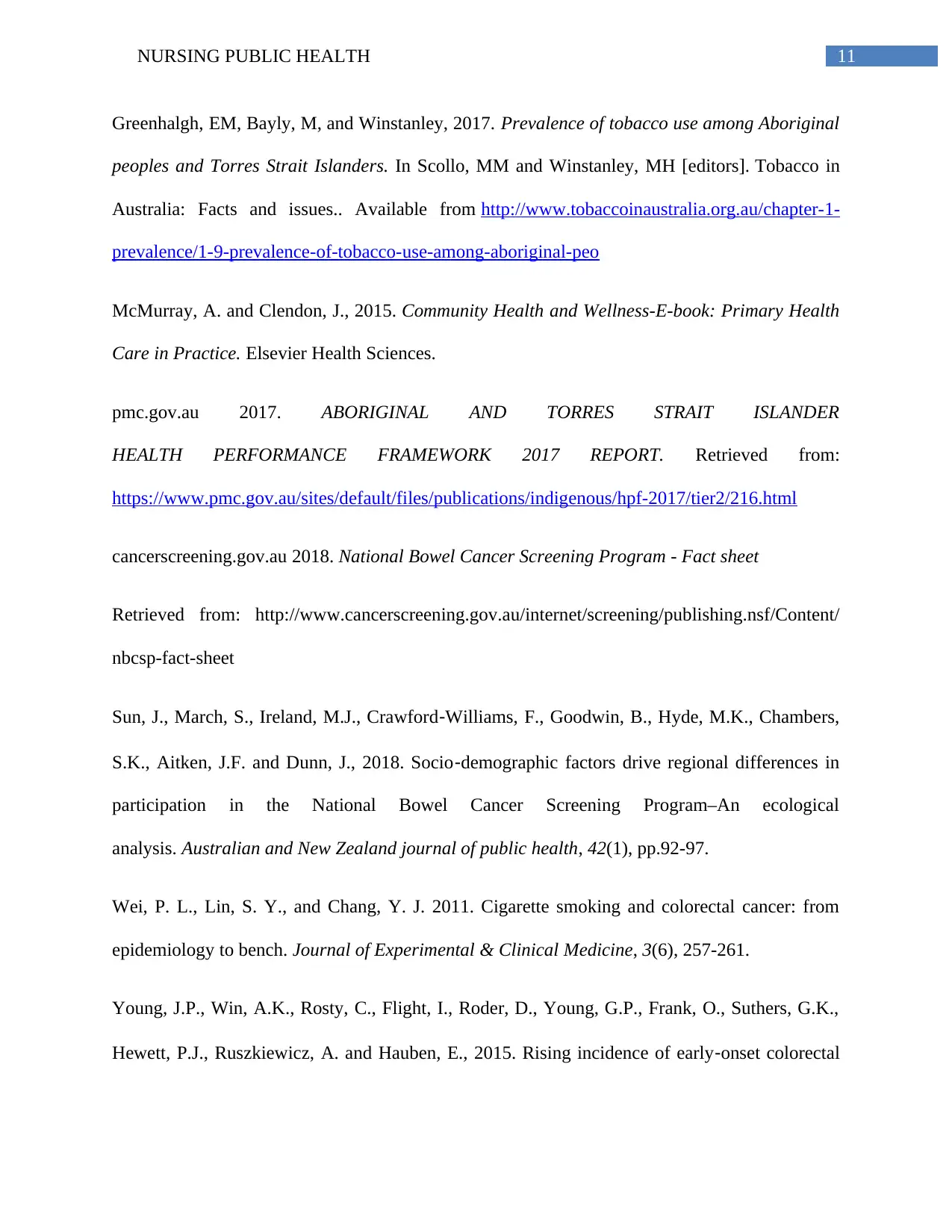
11NURSING PUBLIC HEALTH
Greenhalgh, EM, Bayly, M, and Winstanley, 2017. Prevalence of tobacco use among Aboriginal
peoples and Torres Strait Islanders. In Scollo, MM and Winstanley, MH [editors]. Tobacco in
Australia: Facts and issues.. Available from http://www.tobaccoinaustralia.org.au/chapter-1-
prevalence/1-9-prevalence-of-tobacco-use-among-aboriginal-peo
McMurray, A. and Clendon, J., 2015. Community Health and Wellness-E-book: Primary Health
Care in Practice. Elsevier Health Sciences.
pmc.gov.au 2017. ABORIGINAL AND TORRES STRAIT ISLANDER
HEALTH PERFORMANCE FRAMEWORK 2017 REPORT. Retrieved from:
https://www.pmc.gov.au/sites/default/files/publications/indigenous/hpf-2017/tier2/216.html
cancerscreening.gov.au 2018. National Bowel Cancer Screening Program - Fact sheet
Retrieved from: http://www.cancerscreening.gov.au/internet/screening/publishing.nsf/Content/
nbcsp-fact-sheet
Sun, J., March, S., Ireland, M.J., Crawford‐Williams, F., Goodwin, B., Hyde, M.K., Chambers,
S.K., Aitken, J.F. and Dunn, J., 2018. Socio‐demographic factors drive regional differences in
participation in the National Bowel Cancer Screening Program–An ecological
analysis. Australian and New Zealand journal of public health, 42(1), pp.92-97.
Wei, P. L., Lin, S. Y., and Chang, Y. J. 2011. Cigarette smoking and colorectal cancer: from
epidemiology to bench. Journal of Experimental & Clinical Medicine, 3(6), 257-261.
Young, J.P., Win, A.K., Rosty, C., Flight, I., Roder, D., Young, G.P., Frank, O., Suthers, G.K.,
Hewett, P.J., Ruszkiewicz, A. and Hauben, E., 2015. Rising incidence of early‐onset colorectal
Greenhalgh, EM, Bayly, M, and Winstanley, 2017. Prevalence of tobacco use among Aboriginal
peoples and Torres Strait Islanders. In Scollo, MM and Winstanley, MH [editors]. Tobacco in
Australia: Facts and issues.. Available from http://www.tobaccoinaustralia.org.au/chapter-1-
prevalence/1-9-prevalence-of-tobacco-use-among-aboriginal-peo
McMurray, A. and Clendon, J., 2015. Community Health and Wellness-E-book: Primary Health
Care in Practice. Elsevier Health Sciences.
pmc.gov.au 2017. ABORIGINAL AND TORRES STRAIT ISLANDER
HEALTH PERFORMANCE FRAMEWORK 2017 REPORT. Retrieved from:
https://www.pmc.gov.au/sites/default/files/publications/indigenous/hpf-2017/tier2/216.html
cancerscreening.gov.au 2018. National Bowel Cancer Screening Program - Fact sheet
Retrieved from: http://www.cancerscreening.gov.au/internet/screening/publishing.nsf/Content/
nbcsp-fact-sheet
Sun, J., March, S., Ireland, M.J., Crawford‐Williams, F., Goodwin, B., Hyde, M.K., Chambers,
S.K., Aitken, J.F. and Dunn, J., 2018. Socio‐demographic factors drive regional differences in
participation in the National Bowel Cancer Screening Program–An ecological
analysis. Australian and New Zealand journal of public health, 42(1), pp.92-97.
Wei, P. L., Lin, S. Y., and Chang, Y. J. 2011. Cigarette smoking and colorectal cancer: from
epidemiology to bench. Journal of Experimental & Clinical Medicine, 3(6), 257-261.
Young, J.P., Win, A.K., Rosty, C., Flight, I., Roder, D., Young, G.P., Frank, O., Suthers, G.K.,
Hewett, P.J., Ruszkiewicz, A. and Hauben, E., 2015. Rising incidence of early‐onset colorectal
⊘ This is a preview!⊘
Do you want full access?
Subscribe today to unlock all pages.

Trusted by 1+ million students worldwide
1 out of 13
Related Documents
Your All-in-One AI-Powered Toolkit for Academic Success.
+13062052269
info@desklib.com
Available 24*7 on WhatsApp / Email
![[object Object]](/_next/static/media/star-bottom.7253800d.svg)
Unlock your academic potential
Copyright © 2020–2026 A2Z Services. All Rights Reserved. Developed and managed by ZUCOL.





